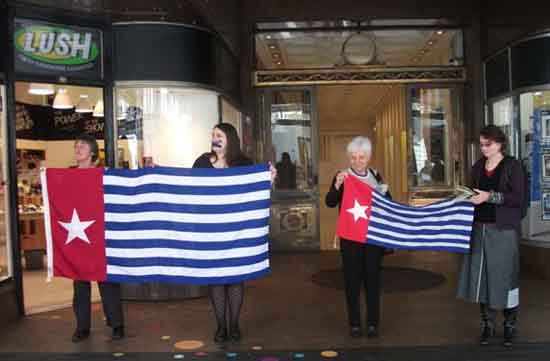
MELBOURNE (Radio Australia / Pacific Media Watch): Activists calling for the independence of Indonesia's West Papua region now have an unlikely ally in a cosmetics company.
Stores belonging to the 'Lush' franchise in Australia and New Zealand have this week launched a campaign to support the 'Free Papua' movement.
But the Indonesian government has questioned the motives behind the campaign, as Auskar Surbakti reports.
Correspondent: Auskar Surbakti
Speakers: Megan Taylor, Lush campaigns manager; Ronny Kareni, Rize of the Morning Star activist; Richard Chauvel, Victoria University researcher; Richard di Natale, Greens senator from Victoria
SURBAKTI: The Morning Star flag is a symbol used by Papua's pro-independence activists.
Raising the flag in the province can be met with imprisonment, but it's proudly being displayed in the stores of cosmetics maker, Lush.
Megan Taylor is the company's campaigns manager and says the cause fits in with its ethical philosophy.
TAYLOR: This week at Lush we're using our stores to campaign in support of the Free West Papua movement. It's a campaign that has run in the UK and Ireland and the Netherlands and this week it's running in Australia and New Zealand. What we're doing in store is raising the banned West Papuan flag in all of our store windows. We're also having flyers, we're handing out educational material to our customers and selling a limited edition perfume which will go towards campaign groups to help with their campaign work to free West Papua.
SURBAKTI: The privately owned British company has supported other causes in the past, including animal rights and gay marriage.
Its Australian operations have partnered with the independence group, Rize of the Morning Star.
Ronny Kareni, an activist from the organisation, says the added support will help raise awareness of their cause to the wider public.
KARENI: This is really a great step moving forward to shine a light these human rights abuses going on in Australia's doorstep and it's great there's people out there in the wider community in Australia that are taking up the issue of West Papua and supporting in whatever ways and it's been great to have Lush to take this campaign further and it's good that the voices of the West Papuan people now have been heard through this campaign.
SURBAKTI: Indonesia took control of of the province soon after Papuans declared independence from the Dutch in 1961, after the US leaned on the Netherlands to accept Indonesia's claims.
In 1969, a selected group of Papuans voted for Indonesian control in a UN-sponsored referendum, but the so-called 'Act of Free Choice' was widely criticised as being rigged.
The Papuan independence movement doesn't yet receive the popular suppport enjoyed by other causes and that's something Lush is hoping to change.
TAYLOR: Of all the campaigns we've done, it's probably one we've had to really explain because not many people know what the issue is. Last month, we did a campaign for marriage equality and that's obviously had a lot of media attention whereas the West Papuan cause is something we really need to tell people about and explain what's happening, what the Australian government could be doing and why we need to get up and show our support.
SURBAKTI: And at least one expert believes the campaign will succeed in its aim to raise awareness.
Richard Chauvel is a long-time researcher of the region based at Victoria University in Australia.
CHAUVEL: To the best of my knowledge, it's the first time there has been a commerical campaign in support of West Papua in Australia and in this case it's a shop front retail campaign. I think from the point of view of the activists in Papua and their supporters outside, I think it has the potential to reach a somewhat different audience than the sorts of political campaigns that have been run by activist groups in Australia and elsewhere.
SURBAKTI: The issue of Papua's independence threatened to sever Australia's ties with Indonesia in 2006, when Jakarta recalled its ambassador after Australia's immigration department granted visas to 42 Papuans who arrived by boat.
An official from the Indonesian embassy in Canberra says he's surprised by Lush's campaign and questions what the company knows about the situation on the ground in Papua, which was granted special autonomy status in 2001.
The Australian Greens party, which supports the pro-independence movement, says the Indonesian government should allow free access to the province if there's nothing to hide.
Richard di Natale is a Greens senator from the state of Victoria.
Di NATALE: The Indonesian authorities have the potential to shine some light into the area, to show the world that in fact they are working towards a peaceful resolution in the region, but instead what we're seeing is secrecy and people like Lush, companies like Lush being forced to bring this to the attention of the world because otherwise we're simply not hearing what's happening in the region.
SURBAKTI: But the Indonesian embassy says it already grants visas to foreign journalists and organisations into Papua.
In the meantime, Lush hopes its campaign will resonate with its customers who they hope will bring the message to Australia's politicians.
This work is licensed under a Creative Commons Attribution-NonCommercial 3.0 New Zealand Licence.




